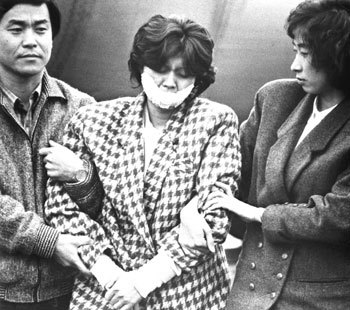 |
|
Kim Hyon-hui after being extradited to Seoul. (Hankyoreh archives)
|
Chun attempted to exploit incident for political gain
The Chun Doo-hwan administration waged an intense diplomatic campaign to extradite Kim Hyon-hui to South Korea ahead of the 1987 presidential election while she was being held in Bahrain in connection with the bombing of KAL Flight 858 the same year. The attempt to exploit the incident for political ends was officially confirmed in 250,000 pages of diplomatic documents from 1987 to 1988 declassified by the Ministry of Foreign Affairs on Mar. 31. Plans were also found to have been considered for Kim to remain in Bahrain if she could not be repatriated before the election. In response to the disappearance of KAL858 on Nov. 29, 1987, while traveling from Baghdad to Seoul with 115 passengers and crew members on board, the Chun administration sent then Assistant Foreign Minister Park Su-gil as a special envoy to Bahrain, where suspect Kim Hyon-hui (also known by the Japanese alias Mayumi Hachiya) was being held. On Dec. 8, Park reported on a tip to journalists from the US embassy in Bahrain. It quoted the Bahrain Foreign Minister as saying there was not deemed to be sufficient evidence to conclude that vials of poison used in a suicide attempt by Kim and the suicide of “Shinichi Hachiya” (accomplice Kim Seung-il) in Bahrain were necessarily North Korean-made, and that there was no “conclusive evidence” that “Mayumi” was involved in the KAL bombing. In a Dec. 9 meeting with Park, the Bahrain Foreign Minister promised “active cooperation in resolving [Kim Hyon-hui’s] extradition matter,” but insisted that the South Korean side needed to “submit documents providing more concrete evidence such as a confirmation of Mayumi’s identity in order to avoid censure by the international press.” The message read as last-minute hesitation from Bahrain despite the Chun administration’s all-out efforts to deport Kim to South Korea ahead of the presidential election. In the midst of the discussions, Park explained that an “extradition announcement must be received from the country of residence by Dec. 12 for Mayumi to arrive as late as [Dec.] 15th [of 1987], if the flight time is taken into account.” “If the date is postponed, we may consider washing of the matter by insisting that the Bahraini government investigate and handle things themselves,” he suggested, in a message seen as reflecting the upcoming presidential election on Dec. 16 of that year. Indeed, Park would eventually apply pressure on Bahrain when it announced a postponement five hours ahead of Kim’s initially agreed-upon departure time of 8 pm on Dec. 13. “Owing to the domestic situation, we are not of the position that Mayumi can be transferred at any time at all,” he explained at the time. The extradition was finally approved a day ahead of time, and Kim arrived in South Korea on Dec. 15 – a day ahead of the presidential election, as the Chun administration had planned. Additional evidence of the Chun administration’s attempts to make political use of the incident for the presidential election previously came to light in documents made public in 2006 by the National Intelligence Service Development Committee for Clarifying the Past. By Kim Ji-eun, Park Min-hee and Noh Ji-won, staff reporters Please direct comments or questions to [english@hani.co.kr]





